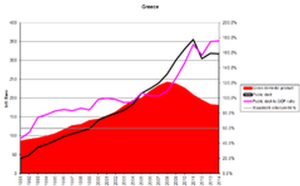“In prewar Germany, blaming Jews was an essential element of the economic system that pulled the country out of the Great Depression.”
 Athens, July 2 – Accusing Jewish bankers and currency speculators of being behind Greece’s recent monetary woes has proved inexplicably useless in getting the country out of its economic morass, Greek officials are reporting.
Athens, July 2 – Accusing Jewish bankers and currency speculators of being behind Greece’s recent monetary woes has proved inexplicably useless in getting the country out of its economic morass, Greek officials are reporting.
While the perception of Jewish financier guilt has proved popular in Greece amid a worsening economic crisis, giving voice to those accusations has, for reasons economists have been unable to explain, done nothing to alleviate the problem. The futility of vocally blaming Jews for the distress continues to puzzle Greek officials, since in the past, accusing Jews of manipulating, controlling and ultimately destroying a country has similarly failed to help any society progress.
Greeks lined up to withdraw cash from ATMs across the country alternately blamed Jews, Germany, the US, and the country’s own leadership for the Hobson’s choice facing Greece. To repay the massive debts Greece owes to its creditors – primarily other European nations such as Germany – the country must adopt austerity measures that would restrict services and funds available for popular social programs, cuts that strike at the heart of Greece’s experience with government. The alternative is to default on the loans that have already come due, which would trigger a host of negative repercussions for the Greek economy, possibly including expulsion from the bloc that uses the Euro. Such an event would force Greece to revert to its pre-Euro currency, the drachma, which would inevitably carry little value and subject Greeks to massive inflation and render them unable to conduct an economically stable life. Eventually, even some of those who leveled blame at the US, Germany, and Greek politicians, said they saw Jewish fingerprints on every negative aspect of the situation. Economists say they are flummoxed that the propensity to assign blame to the Jews has not helped the country extract itself from the crisis.
“It’s always worked before,” noted Watda Hellisdis, professor of economic theory of the University of Athens. “In prewar Germany, blaming Jews was an essential element of the economic system that pulled the country out of the Great Depression,” he noted. “Granted, they were much more diligent about putting their jackboots where their mouths were, those Germans, but we’ve seen no improvement at all in our situation. It boggles the mind.”
Hellisdis cited several other examples, such as Arab countries that directed harsh oppression at their Jews once Israel was established. “The scapegoating of the Jews, while primarily an act of politics aimed at expressing solidarity with Palestinian Arabs, also had its economic side. Their property was nationalized and confiscated, and economic impact of that treatment of the Jews is part of what made those countries what they are today, economically,” he added. “Just look at the per capita income of Egyptians, for example. It’s a much larger small fraction of the average European income than it used to be.”
“Although, if things continue not to improve by our blaming the Jews, that figure is also likely to change.”




